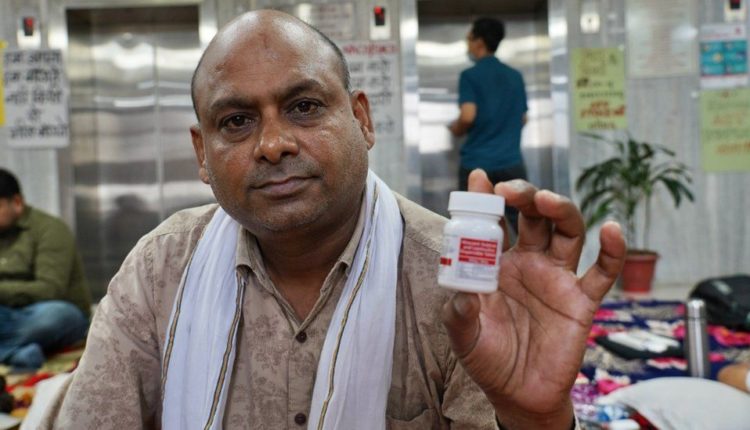For more than three weeks, Jaiprakash, who lives in India’s capital, Delhi, has been taking 11 tablets a day instead of the two he is supposed to take.
The reason, the 44-year-old says, is that he is unable to access the right dosage of the combination medicine prescribed to him for HIV. So, he has found a temporary workaround – he ingests additional pills from a bottle of lower dosage tablets usually given to children.
Jaiprakash is among hundreds of thousands of Indians living with HIV who depend on free medicines provided by the government through anti-retroviral therapy (ART) centres across the country.
For weeks, he and other members of an HIV activist group have been protesting in front of the Delhi office of the National Aids Control Organisation (Naco) – the federal agency that procures drugs from pharmaceutical firms by issuing tenders. They allege that there is a critical shortage of essential drugs, including Dolutegravir 50mg – which Naco has recommended as “the preferred drug for all lines of treatment of HIV infection”.
These medicines have to be taken daily – experts say a treatment interruption can cause a person’s viral load to rise, heighten risks of HIV transmission and drug resistance, and make them more vulnerable to secondary infections such as tuberculosis. While the drugs are available at private medical shops, many are unable to afford them .
Hari Shanker Singh, one of the protesters, says that earlier, ART centres used to give medicines for at least a month.
“But over the past few months, we started getting reports from our members in various states that they were receiving medicines for only a couple of weeks. Then that time period also began getting shorter,” he alleges, adding that this is hard on people who can’t afford to travel to ART centres every few days.
India’s health ministry – which Naco reports to – has denied the allegations.
“There is no stock-out of drugs and there are no instances of disruptions or non-availability of treatment services or ARV medicines at the national and state levels,” the ministry said in response to the BBC’s questions.
Activists allege that the current disruption arose because the tender was issued late, and that the process was delayed further because the “shortlisted bidder was found to be blacklisted”.
The health ministry didn’t respond specifically to the BBC’s query on this allegation, but said that “fresh supply orders for the next lot of several drugs” have been given, and that it expected to receive supplies before the current stock ran out.
India has the world’s third largest number of people living with HIV (PLHIV), at around 2.3 million. The country started providing free anti-retroviral drugs in 2004 – initially for first-line treatment and then scaling up gradually over the years.
This was three years after Indian pharma major Cipla started producing a generic version of the highly expensive cocktail of three drugs that were, until then, manufactured by multinational companies.
Before that, says activist Loon Gangte, the cost of medicines for a patient was $12,000 (£9,800) per year and “neither governments nor ordinary people could afford it”.
Source: BBC




Comments are closed.